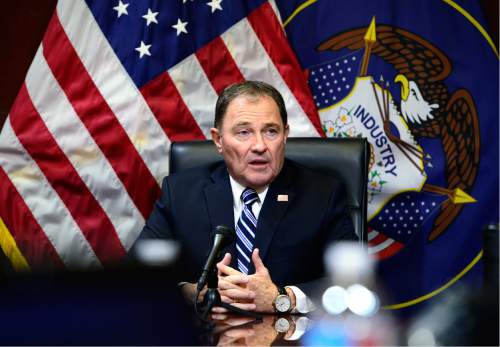This is an archived article that was published on sltrib.com in 2016, and information in the article may be outdated. It is provided only for personal research purposes and may not be reprinted.
Gov. Gary Herbert vetoed three bills and used his line-item veto power to whack appropriations for nine budget items late Wednesday, including money for a reality cooking show and a measure that could have prompted federal regulators to strip Utah of a waste-management program.
HB258, sponsored by Rep. Curt Oda, R-Clearfield, passed the House and Senate unanimously and was intended to encourage recycling, by redefining "solid waste facility" under the law to exempt recycling from licensing.
But in a pair of letters March 2 and March 16, the U.S. Environmental Protection Agency notified the governor that it could revoke its approval of Utah's Solid Waste Management Plan and the federally authorized Hazardous Waste Management Plan. Moreover, it said it could rescind certain grants, increase oversight and potentially take more direct control of the state's waste programs.
"While I believe the purpose behind HB258 is good policy, in light of this newly received information from the EPA, it is necessary to veto HB258," Herbert wrote in his veto letter. "The only purpose of this veto is to preserve Utah's authority to administer federally delegated waste-management programs in the best interest of the state."
Herbert said he had committed to meeting with the EPA to work out language that would satisfy the federal agency and call a special session to pass the bill with the agreed-upon language.
The governor also vetoed HB377, which was intended to give grandparents a right to petition a court for rights to visit a grandchild who has been adopted, unless the child is adopted by a nonrelative. It would have allowed the court to override the adoptive parents' decision not to allow a biological grandparent to visit the child.
Herbert said he was concerned that the bill could open the door to grandparents filing repeated petitions with the courts and put no time limit on when such petitions would have to be filed. And, he said, adoptive parents need to be notified at the time of the adoption that such actions by the grandparents are possible.
"I am concerned that, were I to sign this bill as written, we could be jeopardizing the rights of adoptive parents and discouraging adoption by family members," the governor explained.
Again, Herbert said he would work with the bill's sponsor, Rep. LaVar Christensen, R-Draper, to refine the measure and bring it back in a special session.
The third bill the governor vetoed would have exempted the Utah Board of Education from having to hold public hearings when it sets policy under the Administrative Rulemaking Act.
"It is essential that the public be given ample opportunity to comment on these rules," Herbert wrote, "especially as many of these rules create entirely new education programs and policies."
In addition to the vetoed bills, the governor used his line-item veto authority to strike several million dollars in appropriations items from the budget bills, including one for the television cooking competition.
Lawmakers allocated $275,000 for the reality television show, which Herbert said was not something taxpayers should be paying for.
"While reality television shows are fun to participate in and watch, the question is whether taxpayers should be funding 'Teen Chef Masters' television competition," he wrote. "I do not believe that this is an appropriate use of taxpayer dollars."
He struck $3 million that was targeted for software for an early intervention reading program.
Six budget items were meant to accompany bills that did not pass the Legislature, meaning the money couldn't be spent, prompting the governor to wipe them out of the budget bill.
Finally, the governor allowed a bill to become law without his signature. That measure would diminish the role of minority Democrats on the legislative committee that directs legislative audits.
Democrats objected to the bill, arguing that the audit subcommittee had been made up of equal numbers from both parties for decades. But Republicans in the House contended that, because Republicans make up supermajorities in both the House and Senate, they should have more representation in deciding which agencies are audited.
Herbert deferred to the Legislature, saying it's not the governor's role "to interfere in the management and organization of the legislative branch."
The governor signed a bill that reduces the penalties for people who carry a weapon on a bus. It had been a third-degree felony to do so before.
And he signed a bill setting guidelines for the use of police body cameras and the retention of the footage, as well as a resolution honoring the composer of the Broadway musical "Hamilton."
The final action on the remaining bills passed during the 2016 session came late Wednesday night, the last day for the governor to act on legislation. In all, lawmakers passed 475 bills and resolutions, 453 of which required approval or vetoes from the governor. The remaining items were simple resolutions expressing the sentiments of the Legislature and not the governor.
Twitter: @RobertGehrke



